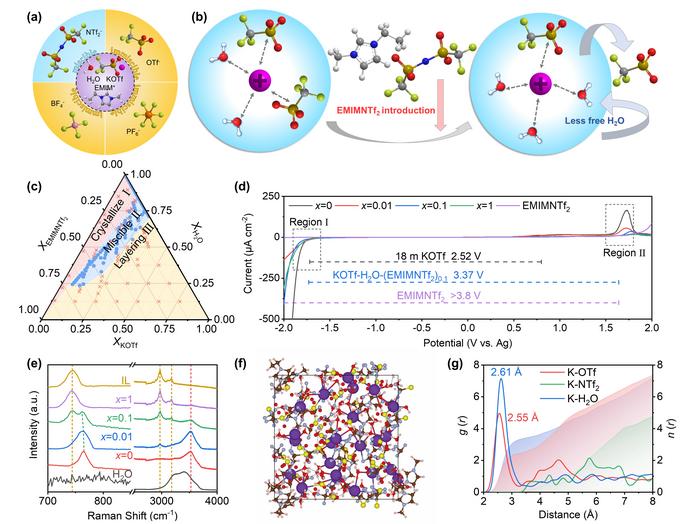
Conventional aqueous supercapacitors have long served as reliable energy storage solutions, but they face significant challenges when operating in extreme temperature conditions. The critical issue revolves around water evaporation, which leads to a reduction in performance and can compromise the overall efficiency of these energy devices. Researchers around the world are tirelessly working to overcome these limitations, exploring innovative alternatives that promise enhanced thermal stability and higher energy capacities. A remarkable instance of this research comes from a team at Shandong University, who have successfully engineered a hybrid electrolyte designed to refine the performance of supercapacitors, particularly under harsh thermal conditions.
The primary breakthrough centers on the innovative combination of potassium trifluoromethanesulfonate, commonly known as KOTf, with the ionic liquid 1-ethyl-3-methylimidazolium trifluoromethanesulfonate (EMIMNTf₂). The amalgamation of these chemical agents is not random; it is a meticulous selection aimed at reshaping the solvation structure surrounding potassium ions. Such alterations yield a significant decrease in the free water activity within the electrolyte solution, effectively curbing potential adverse reactions that could diminish the device’s lifespan and performance.
An integral part of the research includes detailed solubility tests and advanced molecular dynamics simulations, both of which identify EMIMNTf₂ as the prime additive for this hybrid electrolyte. The dynamic interplay between KOTf and EMIMNTf₂ fundamentally alters the interaction of the electrolyte with the electrodes of the supercapacitor, thus maximizing charge storage capabilities. This nuanced understanding of solvation dynamics showcases the critical intersection of chemistry and engineering, where even minute adjustments can lead to substantial enhancements in energy storage technologies.
The impressive results of this research underscore the potential of the developed electrolyte. It manages to deliver an extraordinary electrochemical stability window of 3.37 volts, offering a much more robust performance compared to traditional aqueous supercapacitors. Moreover, the electrolyte exhibits remarkable operational reliability over a broad temperature range, extending from 0 to an impressive 100 degrees Celsius. This characteristic is essential for practical applications where environmental conditions may fluctuate or exceed normal operational temperatures.
In conducting the experiments, the research team observed notable performance metrics at elevated temperatures. At 60 degrees Celsius, supercapacitors utilizing the newly developed electrolyte retained approximately 81.8% of their capacity after enduring an extensive cycle of 10,000 charge-discharge cycles. This resilience speaks volumes regarding the innovation’s capabilities, challenging the existing limits faced by water-in-salt (WIS) based energy storage devices that often falter under similar conditions.
The implications of this research stretch far beyond laboratory experiments; they hold significant potential for practical real-world applications. By successfully bridging the gap between high voltage and thermal stability, this novel hybrid electrolyte approach addresses two critical limitations faced by existing energy storage technologies. Furthermore, it enhances safety, a parameter increasingly recognized as vital for energy storage systems destined for real-world deployment, where reliability in unpredictable environments is paramount.
The findings of this study are published in the esteemed journal Science Bulletin, further cementing the credibility and importance of the research. The seamless integration of ionic liquids into supercapacitor technology represents a frontier that could revolutionize future energy storage systems, especially given the global push towards sustainable and efficient energy solutions. As energy demands continue to rise, innovations like these could play a pivotal role in shaping the future landscape of energy storage.
Moreover, the potential applications of this research extend throughout various sectors, ranging from consumer electronics to electric vehicles, and even renewable energy systems. The quest for higher energy densities and the ability to perform reliably under diverse conditions is a pressing need that has been echoed across multiple industries. The synergy between traditional aqueous systems and advanced ionic liquids may offer a pathway towards achieving these ambitious goals.
In conclusion, the development of this hybrid electrolyte, characterized by its sophisticated composition and exceptional performance metrics, heralds a new era in energy storage technology. The research team’s dedication to understanding and addressing the inherent limitations of conventional supercapacitors is commendable, and their findings undoubtedly pave the way for future explorations. As this field continues to evolve, the integration of hybrid materials will likely become a cornerstone of energy storage innovation in the years to come.
Advancements in energy technologies such as these not only promise to enhance the capabilities of existing systems but also contribute to the overarching narrative of sustainability and efficiency that is crucial in modern technological development. As researchers build upon this foundational work, the potential for breakthroughs that were once unimaginable becomes increasingly attainable. With each iteration, the horizons of energy storage expand, bringing us closer to realizing a future characterized by clean, efficient, and reliable energy sources.
The ongoing evolution in the landscape of energy storage systems signifies a commitment to addressing one of the most pressing challenges facing society today—how to store and manage energy more effectively. Research like that conducted at Shandong University exemplifies the spirit of innovation that underpins this field, ensuring that we remain equipped to handle energy needs now and in the future.
As the scientific community continues to unravel the complexities surrounding energy storage solutions, one can only anticipate the plethora of exciting developments on the horizon. This work stands as a testament to the relentless pursuit of knowledge and innovation, a journey that will undoubtedly yield transformative results and support the global transition towards a more sustainable energy future.
Subject of Research: Hybrid electrolyte for supercapacitors
Article Title: Hybrid Electrolyte Enhances Supercapacitor Performance in Extreme Temperatures
News Publication Date: October 2023
Web References: DOI: 10.1016/j.scib.2025.02.028
References: Science Bulletin
Image Credits: ©Science China Press
Keywords
Ionic liquids, supercapacitors, KOTf, EMIMNTf₂, energy storage, thermal stability, electrochemical performance, molecular dynamics simulations.
Tags: advanced solubility testingaqueous supercapacitor limitationsenergy capacity enhancementextreme temperature energy storagehigh-performance supercapacitorshybrid electrolyte engineeringionic liquid EMIMNTf₂molecular dynamics simulations in energy devicespotassium trifluoromethanesulfonaterevolutionary electrolyte designsolvation structure optimizationthermal stability in supercapacitors





